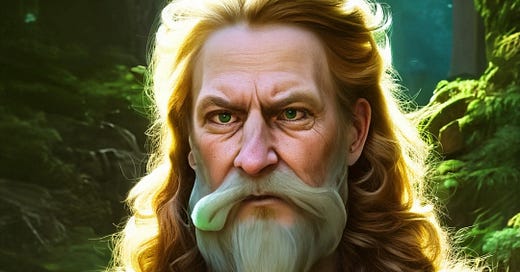The Dagda: Chief of the Tuath Dé Danann
The Dagda: Chief of the Tuath Dé Danann
The Dagda, often revered as the "Good God" or "Father of All," stands as one of the central figures in Irish mythology, particularly within the lore of the Tuath Dé Danann. His character is multifaceted, embodying attributes of a wise leader, a powerful warrior, a nurturing father, and a primal force of nature. This analysis aims to delve into the various facets of The Dagda's character, examining his roles, symbols, myths, and significance within Irish mythology.
Origins and Attributes
The Dagda is a prominent figure among the Tuath Dé Danann, a race of supernatural beings in Irish mythology associated with wisdom, magic, and craftsmanship. He is often depicted as a robust and imposing figure, possessing immense strength and wisdom. In many accounts, he is described as a fatherly figure, caring for and guiding his people with benevolence and wisdom.
One of The Dagda's most distinctive attributes is his magical club or staff, known as the "lorg mór" or "lorg anfaid," which translates to "great staff" or "staff of wrath." This club is said to possess immense power, capable of both granting life and causing death. It serves as a symbol of his authority and might, representing his role as a protector and guardian of his people.
Roles and Responsibilities
As a chief deity of the Tuath Dé Danann, The Dagda assumes various roles and responsibilities within the pantheon. He is often depicted as the leader of the gods, presiding over matters of governance, justice, and war. In some myths, he is portrayed as the father of many prominent figures within the Tuath Dé Danann, such as Brigid, Aengus, and Midir, highlighting his role as a progenitor and protector of his divine family.
Additionally, The Dagda is closely associated with agriculture, fertility, and the cycles of nature. He is often invoked for blessings upon the land, ensuring bountiful harvests and the fertility of livestock. His association with fertility rituals and sacred sites underscores his importance as a deity of abundance and prosperity.
Myths and Legends
The Dagda features prominently in numerous myths and legends, showcasing his diverse attributes and roles within Irish mythology. One of the most famous tales involving The Dagda is the "Cath Maige Tuired" or "The Second Battle of Mag Tuired," in which he plays a pivotal role in securing victory for the Tuath Dé Danann against their adversaries, the Fomorians.
In this myth, The Dagda demonstrates his cunning and resourcefulness by outwitting the Fomorian king, Balor of the Evil Eye, with his magical club. He also showcases his compassionate side by granting mercy to his defeated foes, offering them hospitality and a place among the Tuath Dé Danann.
Another well-known tale involving The Dagda is the story of his encounter with the goddess Morrigan, in which he demonstrates his prowess as a lover and fertility deity. Despite his appearance as a disheveled old man, The Dagda wins Morrigan's favor through his charm and sexual prowess, highlighting his role as a deity of fertility and vitality.
Symbolism and Significance
The Dagda's character is rich in symbolism, representing various aspects of Celtic cosmology and religious beliefs. His association with the club or staff symbolizes power and authority, reflecting his role as a chief deity and protector of his people. The club's dual nature, capable of both giving life and causing death, underscores The Dagda's role as a mediator between the forces of creation and destruction.
Furthermore, The Dagda's association with fertility and agriculture reflects the Celtic reverence for the cycles of nature and the importance of the land in sustaining life. He is often invoked in rituals and ceremonies aimed at ensuring the fertility of the soil and the prosperity of the community.
In addition to his roles as a leader and fertility deity, The Dagda embodies the archetype of the wise old man, possessing profound wisdom and insight. His counsel is sought by gods and mortals alike, underscoring his status as a divine sage and mentor figure within Irish mythology.
The Dagda stands as a central figure within Irish mythology, embodying a complex array of attributes and roles. As the chief deity of the Tuath Dé Danann, he is revered as a wise leader, a powerful warrior, a nurturing father, and a primal force of nature. His myths and legends highlight his diverse talents and virtues, from his cunning in battle to his compassion for his adversaries. Through his symbols and significance, The Dagda remains a timeless emblem of Celtic spirituality, embodying the enduring values of strength, wisdom, and abundance.




